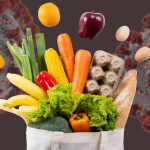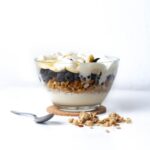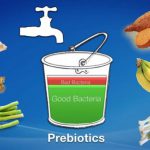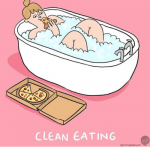Many new moms wonder how breastfeeding will affect their diet. The mother in-law wants her to eat heavy foods, lots of porridge, food she has never even liked before in her life. So it becomes a dilemma for the new mother on what to eat. She wishes to eat what she wants but she is worried because it is not really clear what is best for her as she breastfeeds.
Many mothers I have come across have many questions on their diet changes and what to do about the sudden change. So let me debunk some myths that Kenya women struggle with.
Of eating more than usual to make enough milk for the baby
Although some past research used to be estimated that nursing mothers need an extra 1000 calories a day to produce milk, recent studies from Kenyan nutrition guidelines indicate that this recommendation may be too high.
The food a nursing mother eats is only one of her sources of energy. She also draws on the fat stores she laid down during pregnancy. Milk production is such an efficient process that during the early months, the energy supplied from stored body fat may be all the extra energy that is needed for some mothers, especially those who are not very physically active. Researchers have found that a woman’s metabolism becomes more efficient during lactation. This may mean that each extra calorie goes further in a breastfeeding mother, safeguarding her own health and assuring she has the energy she needs to produce an adequate milk supply for her baby. Losing too much weight too quickly, though, indicates that mother needs more calories.
So really the extra Njahi, porridge or high energy dense food only needs to provide utmost only 500 extra calories!
Of losing weight when breastfeeding
Breastfeeding makes it easier to shed the extra pounds put on during pregnancy. Lactation may be an ideal time to lose weight. Breastfeeding naturally mobilizes fat stores, even fat accumulated before pregnancy. But it is important to go slowly. Nursing mothers do nothing consciously to bring about weight loss during the first two months after birth. During that time your body needs to recover from childbirth and establish a good milk supply. Most breastfeeding mothers will lose a few kgs while following a normal diet. Breastfeeding mothers often shed extra kgs gained during pregnancy when their babies are three to six months old. But do not be in a hurry to lose weight until the baby is 6 months old.
If you aren’t losing weight as quickly as you’d like, you can begin by increasing your activity level and decreasing your caloric intake. By taking a two-mile walk five times a week with the baby in a stroller or baby carrier while at the same time eliminating 100 calories from your daily diet (the number of calories in three teaspoons of margarine or butter), you can expect to lose two or three kgs a month.
Of eating “well” and “wisely”
The principles of good nutrition are the same for the breastfeeding mother as for the rest of the family, eat a wide variety of foods in as close to their natural state as possible. Don’t limit yourself to only a few choices in vegetables or a strictly meat and potatoes diet. Chicken, turkey, fish, eggs, and dairy products are all sources of animal protein, in addition to “red meats” like beef, pork, and lamb. Legumes such as beans and peanuts are also good sources of protein, especially when combined with grains, seeds, certain nuts, and dairy products. Ensure you eat the food you like ensuring your portions only add an extra 500 calories for the first 6 months when breastfeeding.
How about my milk supply?
There are many myths about “magic” foods that will increase a mother’s milk supply–for example, “you need to drink milk to make milk.” However, cows don’t drink milk to make milk during their lactation, and there is no evidence that particular foods or drinks affect milk supply. Milk supply is determined mainly by supply and demand–the more often a baby nurses effectively, the more milk there will be. Conversely, the less often (or less effectively) a baby nurses, the less milk there will be.
If you are concerned about your milk supply, you can determine whether your baby is getting enough milk by counting your baby’s wet diapers and bowel movements. At least six to eight wet cloth diapers (five to six disposables) and two bowel movements a day (fewer bowel movements are normal in a baby older than six weeks) indicate that the baby is getting enough milk. A weight gain of at least four to seven ounces per week (at least a pound a month) is another indication that the baby is getting enough. If your milk supply is low and your baby is nursing effectively, nursing more often will quickly increase your supply.
So there you have it you can still survive with normal food there is no magic in too much extra energy foods. There is simply no connection in those energy dense foods and production of milk! However, foods that increase your blood level (Vitamins), foods that repair worn out tissues (Proteins) are vital for your body as a mechanism for repair after giving birth!










I like this article. Very informative.
Thanks